In Venezuela, Pride Meets Persecution in a Year of Unprecedented Repression
The celebration carried a different weight in a year shaped by relentless hostility against activists and political leaders. Despite the lack of anti-Maduro slogans, it still stood tall as a symbol of resilience and resistance


Photos by Robert Guerra.
The day before this year’s Caracas Pride parade, social media was flooded with posts from queer activists and advocates explaining why they chose not to attend an event that raised urgent questions about visibility, safety, and the limits of resistance. Their message was simple: we live under a dictatorship, without the possibility to ask for what we really need without facing persecution.
The event kicked off at Parque Cristal and made its way to Zona Rental during twelve hours of music, dance, and celebration. While there are no precise attendance figures, one absence was striking: NGOs, activists, and advocacy groups had little to no floats, banners, or visible presence. “Our organization chose to participate as discreetly as possible,” one activist shared from one of Venezuela’s most important NGOs. “Last year, we were highly visible. But since the presidential elections, the queer community has been deeply affected. With activists detained or forced into exile, the landscape for LGBTQ+ visibility and organizing in Venezuela has changed dramatically.”
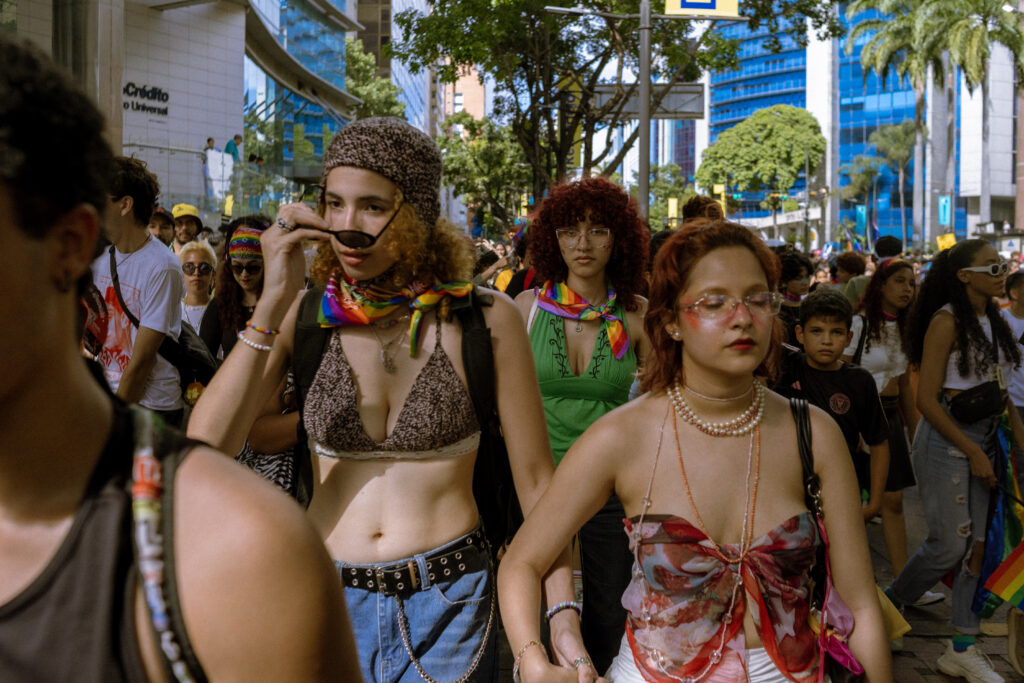
Pride 2023 had set the record in Caracas, with more than 25,000 attendees flooding the streets according to organizers and media. Embassies took a leading role that year, bringing in floats, distributing flyers, and organizing art exhibits and performances by international queer artists. It was the same year that 33 people were detained in a gay bar in Valencia during a raid, where agents showed up without a warrant and with little transparency around the motives for the arrests. Government officials later claimed the location was operating as a “sex club,” citing vague “moral concerns” as justification.
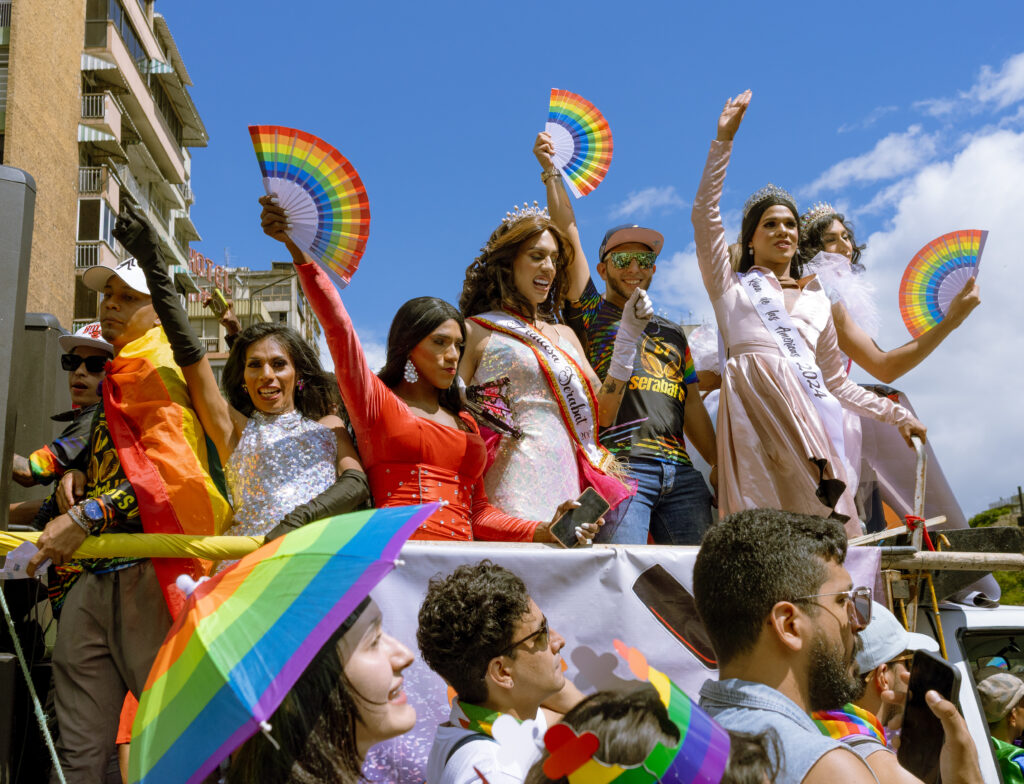
In August 2024, Venezuelan authorities detained Yendri Velásquez, coordinator of the Venezuelan Observatory of LGBTIQ+ Violence, at Maiquetía International Airport as he prepared to travel to Geneva for a United Nations event. Officials informed him that his passport had been annulled and held him incommunicado for six hours, denying access to legal representation or family contact. He was later released without formal charges or documentation, in a location unrelated to the airport.
The lack of overt political slogans was obvious in 2025, messages that had been central themes in previous years (…) Few mentioned Maduro, police abuse, or the activists behind bars. Almost no one called out the state’s support for churches that preach against LGBTQ+ and women’s rights.
A week later, unidentified police agents tried to detain LGBTQ+ activist Kody Campos when they carried out another warrantless raid on his home in a working-class neighborhood of Caracas, raising serious concerns about arbitrary detention and the targeting of LGBTQ+ human rights defenders. Officers decided not to capture Campos as he launched an Instagram livestream documenting the attempt to arrest him.
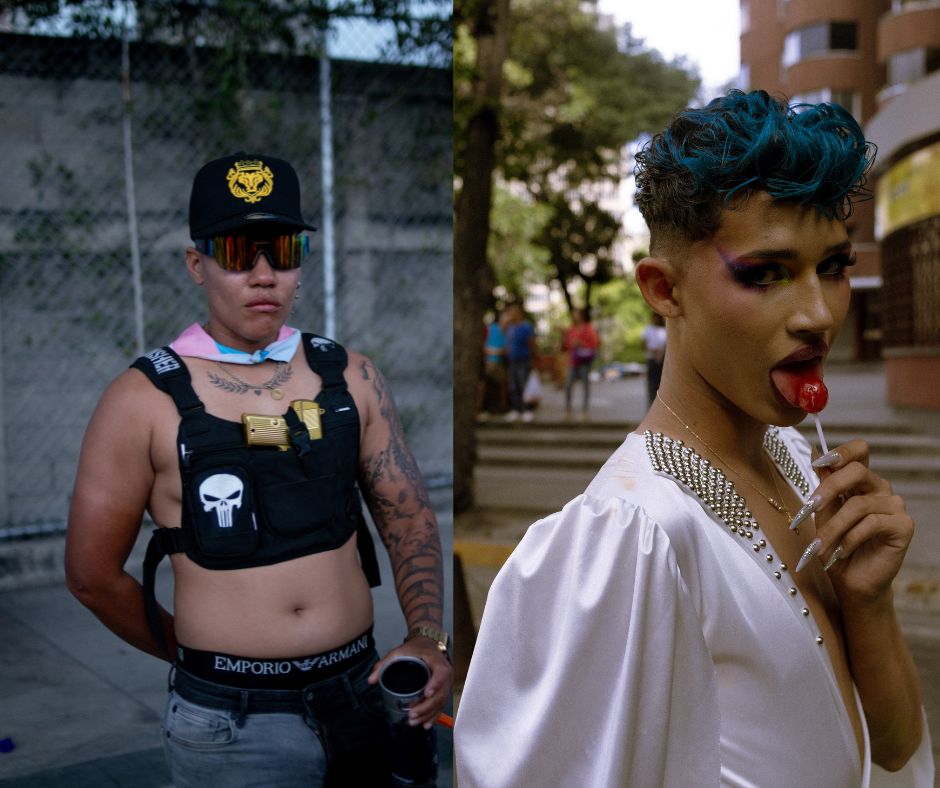
Countless queer and human rights advocates have had to flee the country since then, which represents a serious loss in a country with some of the most outdated LGBTQ+ legislation in the region. Domestic laws don’t accept equal marriage, adoption rights for same-sex couples, legal recognition of trans identities, and comprehensive protections against discrimination. There are no clear penalties for hate crimes, and LGBTQ+ individuals face systemic barriers to justice, healthcare free of pathologization, inclusive education, and protection from institutional and police violence.
One thing stood out as people walked the parade. The lack of overt political slogans was obvious in 2025, messages that had been central themes in previous years. Most posters celebrated queerness, autonomy, and the right to love freely—but barely any named the violence that shadows queer lives in Venezuela. Few mentioned Maduro, police abuse, or the activists behind bars. Almost no one called out the state’s support for churches that preach against LGBTQ+ and women’s rights. The silence was loud.
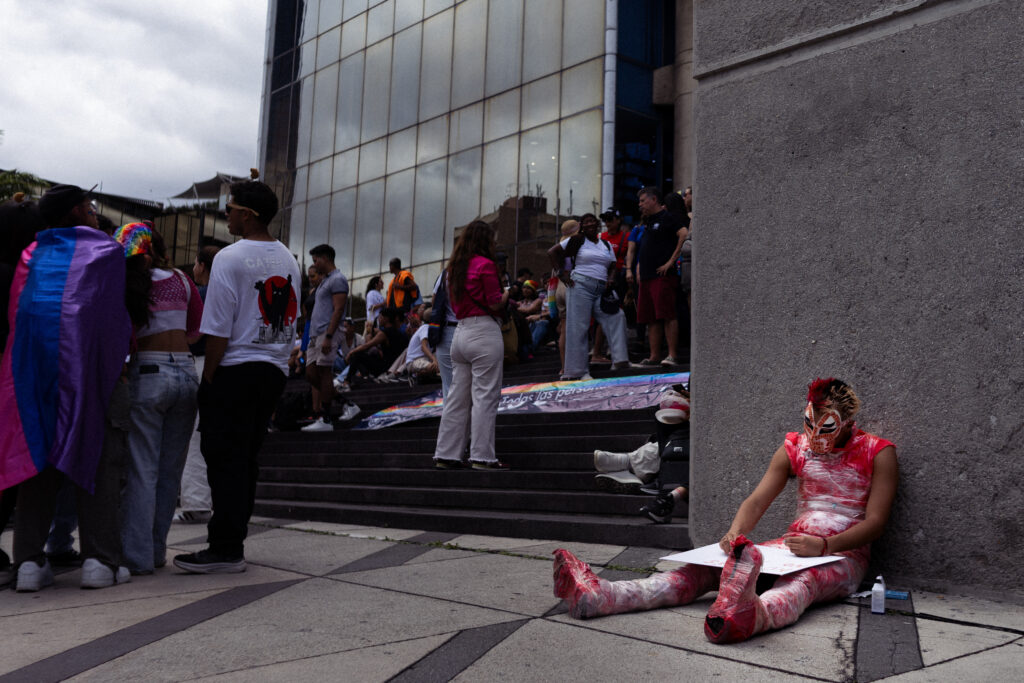
“We have no information about our situation as a vulnerable community: no statistics on discrimination, violent deaths, harassment, persecution, or violence against the LGBTQ+ population. The last data I found was from 2017,” explains Santiago, a 27-year-old queer poet from Caracas.
“How are people supposed to understand that our lives are at risk without data to back it up? This is also the government’s responsibility toward its citizens.”
Santiago also expressed concern and disappointment about the messages shared in this year’s Pride: “I must admit I’m underwhelmed by what I saw today. I understand that we want to celebrate and feel free, but we’re not. Celebrating in this context feels out of touch. Several people told me that my banner [which said vidas desangradas por el odio or “lives bled out by hatred”] was too negative, but we’re living through a painful reality. I don’t want to be forced to celebrate. For us, Pride should be a protest, a riot, a scream of resistance.”
In previous years, organizations monitored and documented violence during Pride. That work was not formally carried out this year, but a queer collective still managed to track two incidents. “One came from a trans girl who said she was verbally harassed during the parade. The other involved a couple who were kissing goodbye in front of their home after the event. Two police officers approached them and extorted them, accusing them of committing ‘lewd acts in public.’”
For Antonia, a bisexual 23-year-old student from Barinas, getting to Pride in Caracas this year felt like a test of resilience.
“Usually, the university’s student council provides three buses so we can come celebrate, but this year there was nothing. They said it was due to a lack of resources,” she explains. Information was scarce until they learned that PSUV, the Venezuelan ruling party, would provide a single bus in Barinas along with food and water for the day. Despite the growing obstacles facing queer activism, Antonia is grateful for the space and sees signs of progress: “Every year I see more bisexual representation. More than half of the LGBTQ+ population is bisexual, but we still face a lot of stigma and invisibility. This year, I saw so many flags. Even with all the setbacks, more people seem to be opening up.”
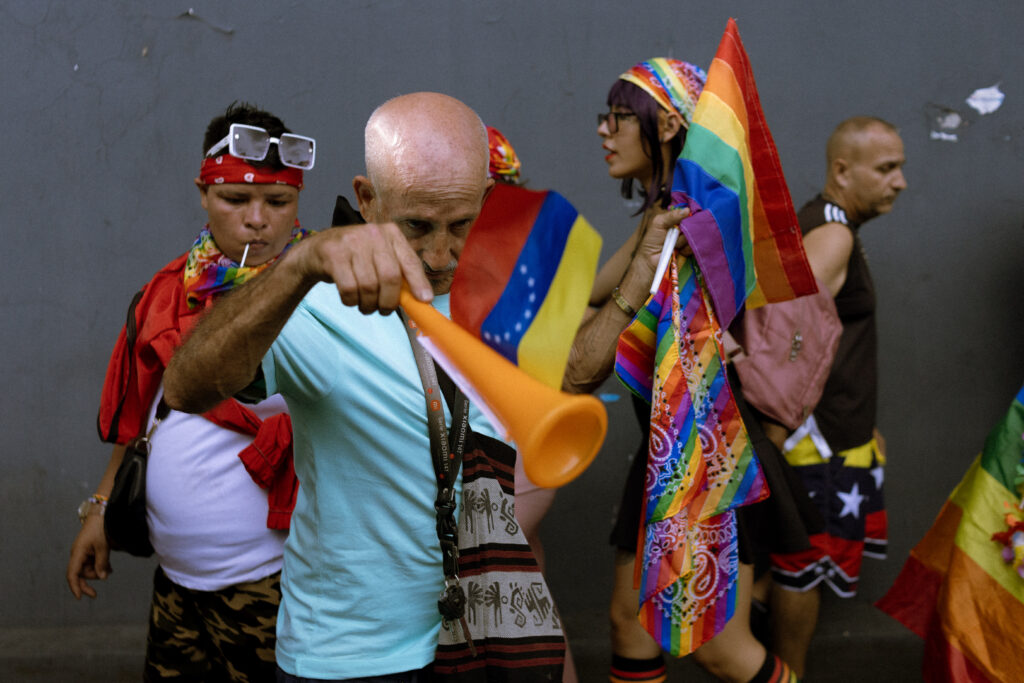
Since the 2024 presidential elections, covering protests in Venezuela has become increasingly difficult. Over 16 journalists are currently imprisoned, and most media outlets have suspended on-the-ground reporting due to the wave of detentions that followed. This year, after the abrupt halt of USAID funding, nearly all independent media have reduced or stopped their coverage inside Venezuela, particularly on gender and human rights issues. The sharp lack of media coverage at this year’s Pride was no coincidence. Journalists on the ground chose not to wear press badges, fearing recognition by police forces. Many weren’t even on assignment. They came as private individuals, quietly capturing moments for themselves rather than for publication.
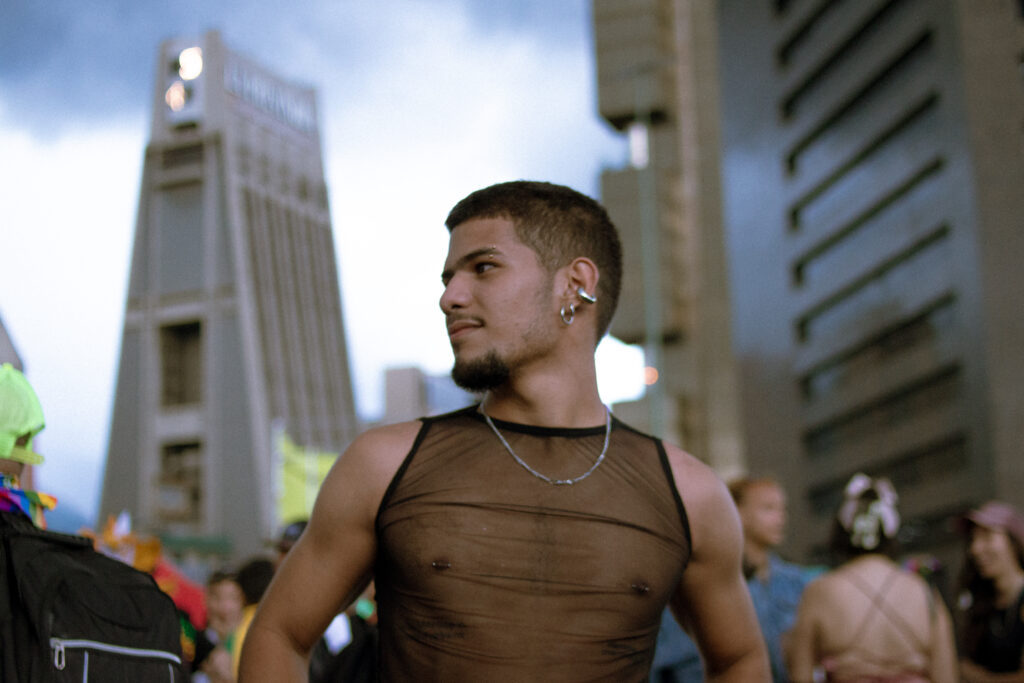
Ana, a journalist from Yaracuy who specializes in sexual and reproductive rights in Venezuela, explains that most NGO communications teams were let go due to severe underfunding. “We usually work on press releases during Pride Month: we gather data, launch campaigns, and provide live coverage of the event,” she says. “Spokespeople go to social media and the press. But this year, the risk to activists is too high. Many have chosen silence. Advocacy has been reduced to the bare minimum.”
“The persecution of NGOs has made it almost impossible for them to have the resources and means to help the community. The proof is right here—as you can see, this isn’t even half the number of people who attended last year,” says a former anonymous volunteer from País Narrado, an NGO that shut down its operations last October, during the unprecedented wave of repression that followed the July 28th presidential election. “Unfortunately, you have to adapt your work to the socio-political circumstances—otherwise, you get censored.”
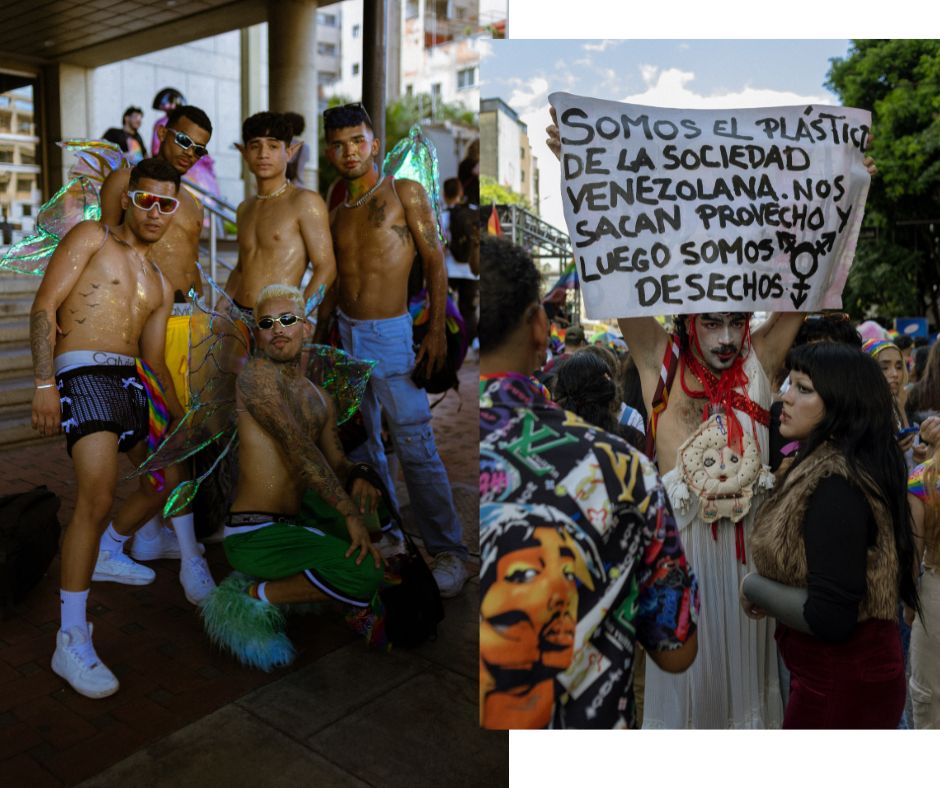
País Narrado was one of two NGOs that closed their operations in 2024 due to the “lack of guarantees and massive, indiscriminate threats against human rights defenders and social leaders,” as Danny Toro, the NGO’s founder, told Tal Cual newspaper last year. “That’s why there’s less activism, less participation, and smaller turnouts—especially affecting minority and economically vulnerable groups. The task ahead is monumental,” the former volunteer added.
Moreover, LGBT organizations not only face an authoritarian state, but one that has done nothing to promote inclusion for these populations and, on the contrary, actively encourages a homophobic and discriminatory discourse.
Pao, a non-binary teenager, attended Pride accompanied by their mom and dad. “I came because these spaces have become crucial for me. Surviving as a trans person is hard, especially in a place like Venezuela,” they say. “Last year, a religion teacher tried to lure me to conversion therapy. My family accepts me for who I am, but that doesn’t mean everyone does.”
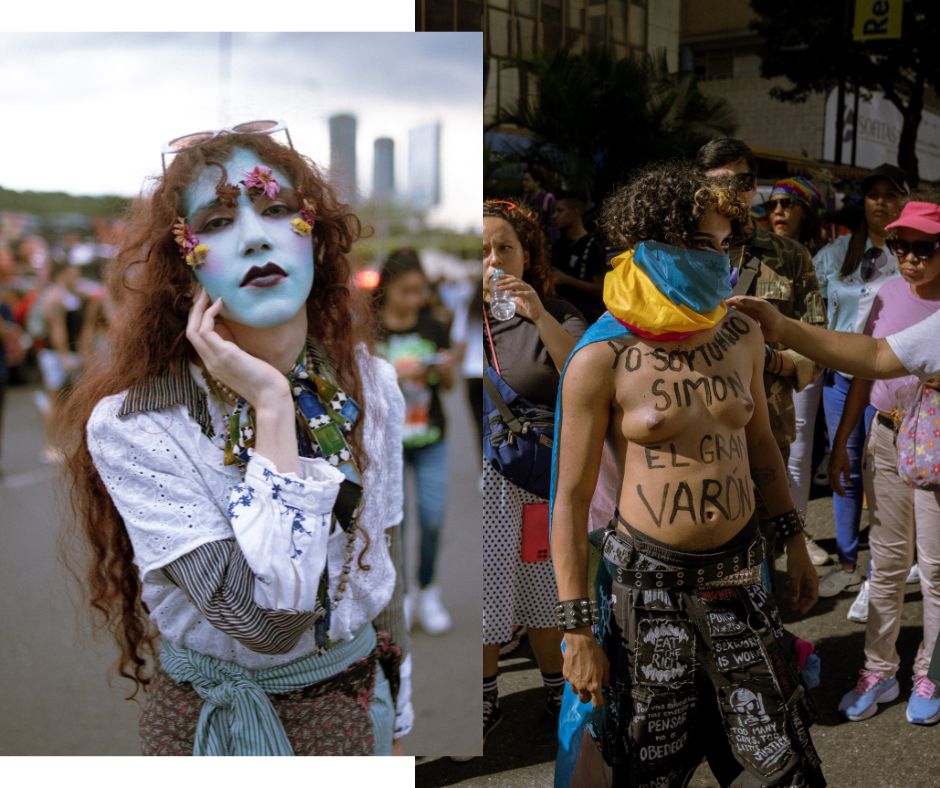
Pao’s mother adds, “Sometimes it’s hard to grasp what our loved ones go through every day. In this case, we knew the teacher’s behavior was inappropriate and made our child uncomfortable, but we didn’t immediately recognize it as conversion therapy. In Venezuela, it’s not like in the U.S. where queer kids are sent to camps. Here, it’s more subtle, normalized, and often spread by teachers, religious leaders, even healthcare professionals, without being named for what it is.”
Carla is dressed honoring the bisexual flag: bold makeup and a bright pink and purple outfit. “As a queer person, I feel marginalized, left out, sometimes even hated. And this sort of space is fundamental, even therapeutic for me,” she explains slowly. “It’s not just about our rights, it’s about our loneliness, our right to feel love and be loved.”
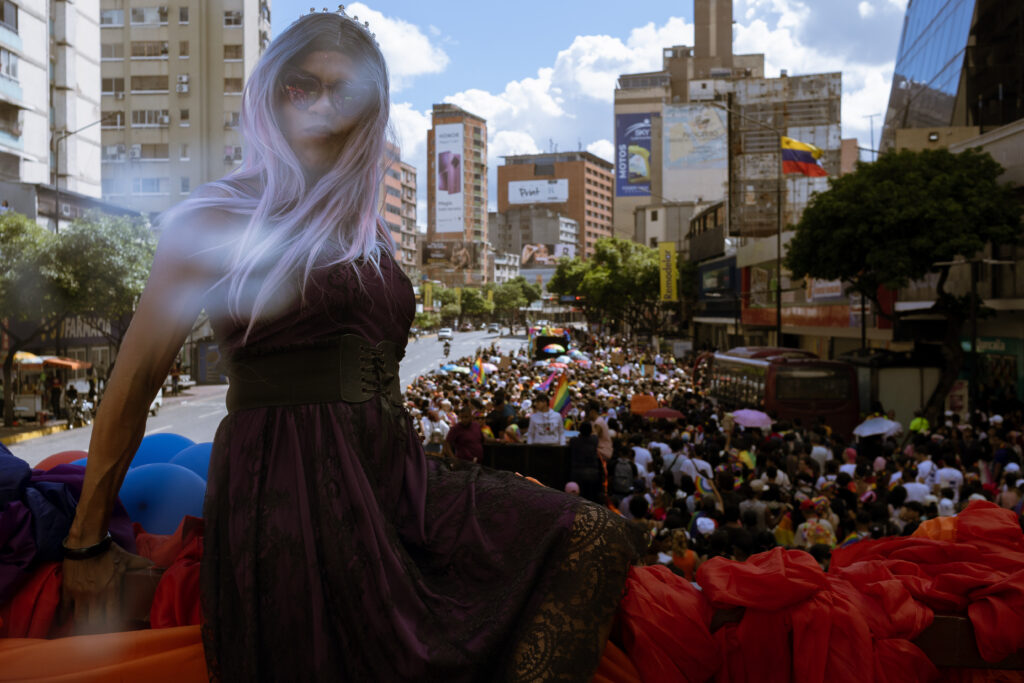
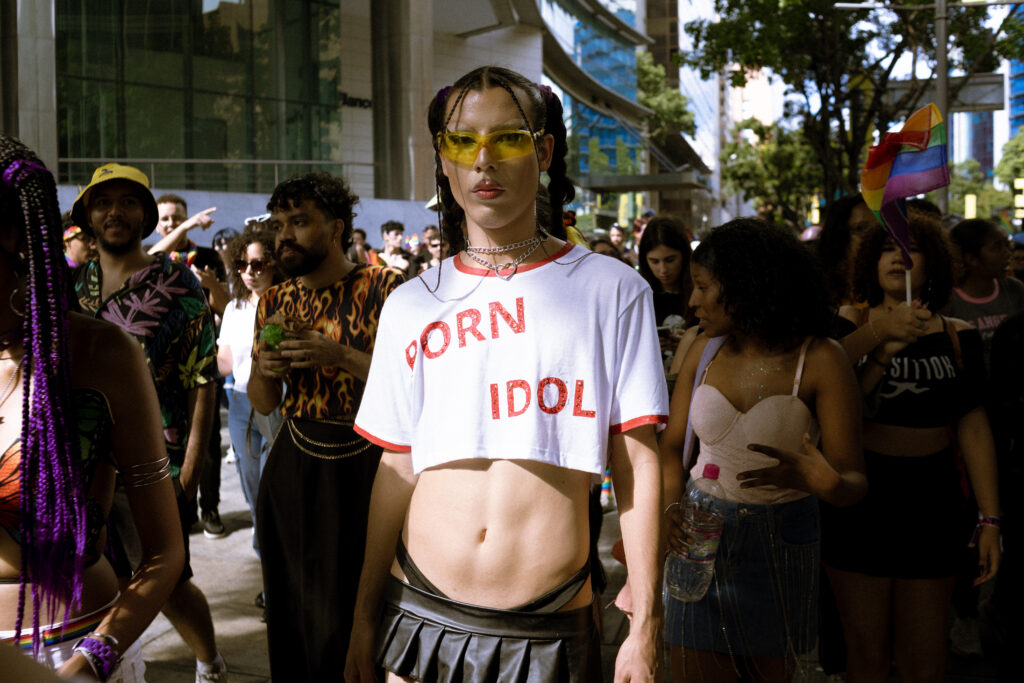
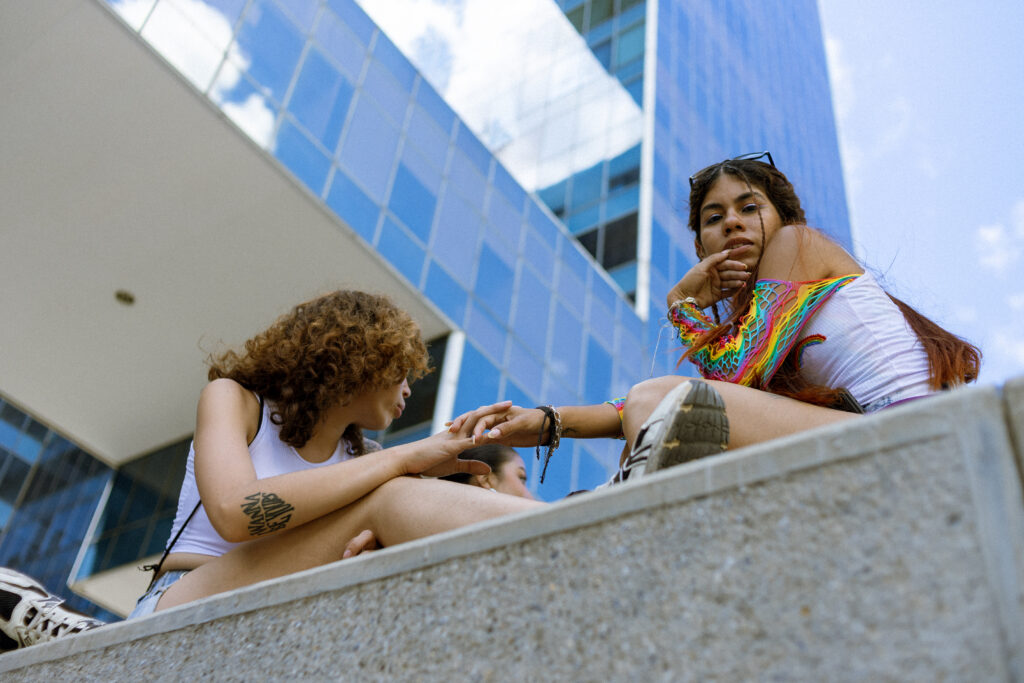
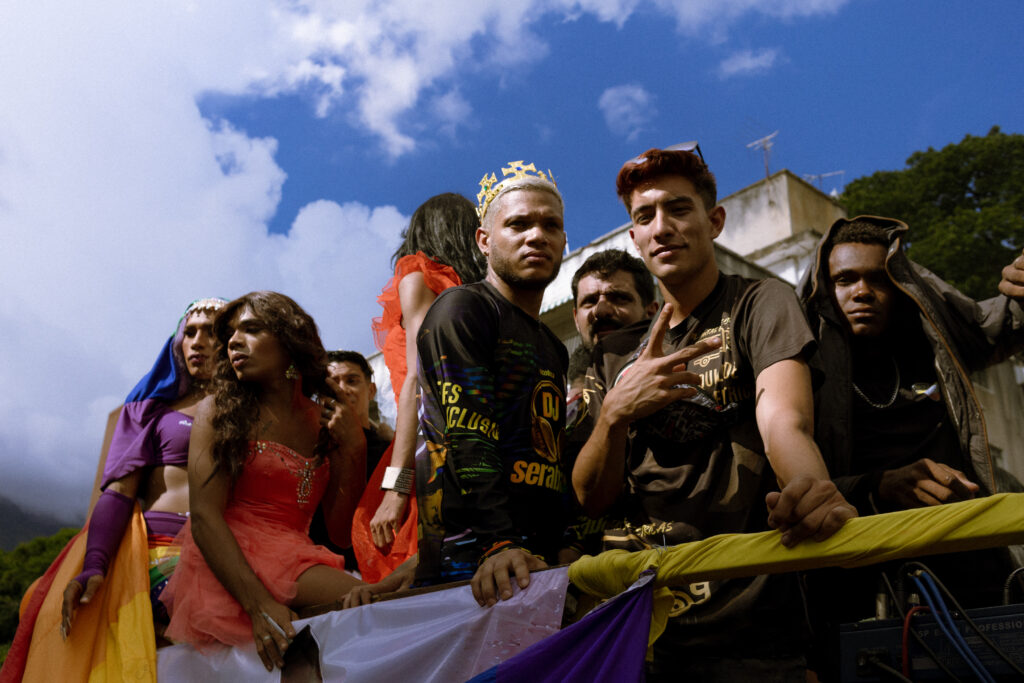
Caracas Chronicles is 100% reader-supported.
We’ve been able to hang on for 22 years in one of the craziest media landscapes in the world. We’ve seen different media outlets in Venezuela (and abroad) closing shop, something we’re looking to avoid at all costs. Your collaboration goes a long way in helping us weather the storm.
Donate




